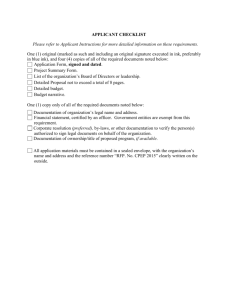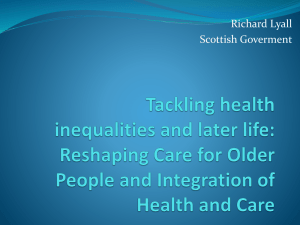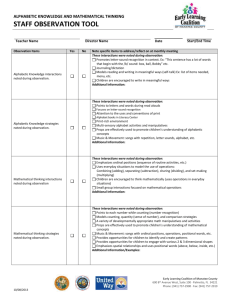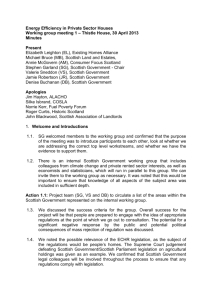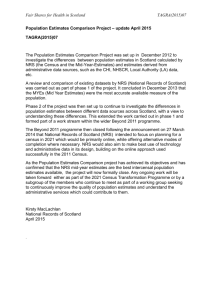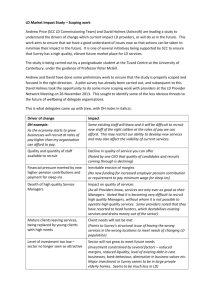DEATH CERTIFICATION NATIONAL ADVISORY GROUP
advertisement
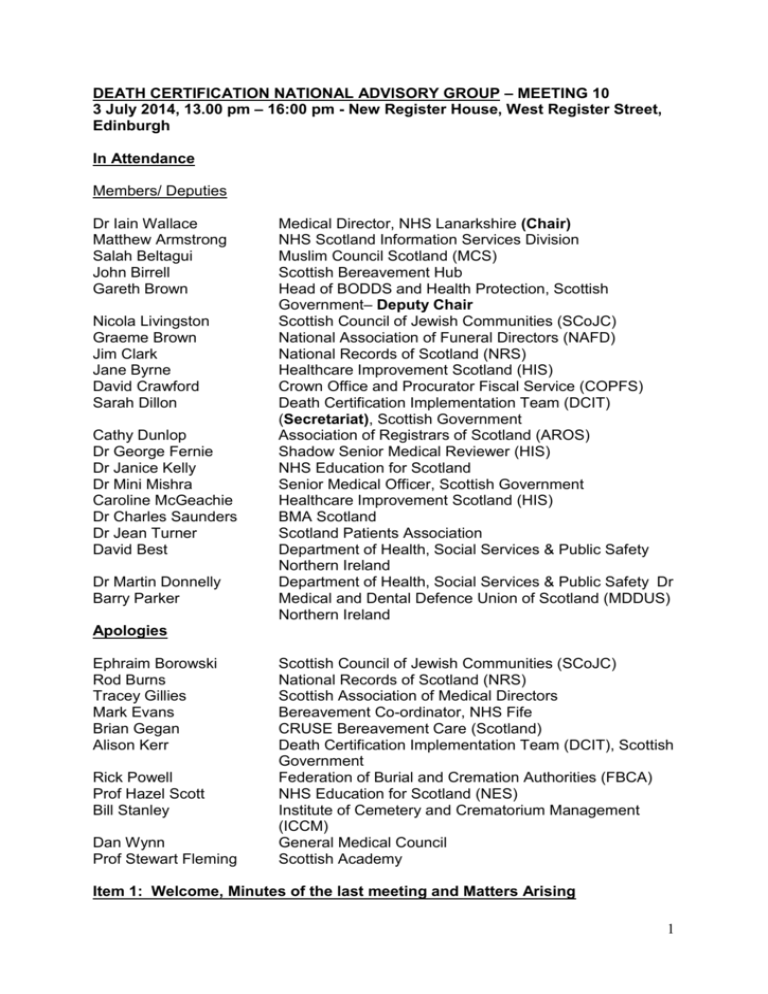
DEATH CERTIFICATION NATIONAL ADVISORY GROUP – MEETING 10 3 July 2014, 13.00 pm – 16:00 pm - New Register House, West Register Street, Edinburgh In Attendance Members/ Deputies Dr Iain Wallace Matthew Armstrong Salah Beltagui John Birrell Gareth Brown Nicola Livingston Graeme Brown Jim Clark Jane Byrne David Crawford Sarah Dillon Cathy Dunlop Dr George Fernie Dr Janice Kelly Dr Mini Mishra Caroline McGeachie Dr Charles Saunders Dr Jean Turner David Best Dr Martin Donnelly Barry Parker Medical Director, NHS Lanarkshire (Chair) NHS Scotland Information Services Division Muslim Council Scotland (MCS) Scottish Bereavement Hub Head of BODDS and Health Protection, Scottish Government– Deputy Chair Scottish Council of Jewish Communities (SCoJC) National Association of Funeral Directors (NAFD) National Records of Scotland (NRS) Healthcare Improvement Scotland (HIS) Crown Office and Procurator Fiscal Service (COPFS) Death Certification Implementation Team (DCIT) (Secretariat), Scottish Government Association of Registrars of Scotland (AROS) Shadow Senior Medical Reviewer (HIS) NHS Education for Scotland Senior Medical Officer, Scottish Government Healthcare Improvement Scotland (HIS) BMA Scotland Scotland Patients Association Department of Health, Social Services & Public Safety Northern Ireland Department of Health, Social Services & Public Safety Dr Medical and Dental Defence Union of Scotland (MDDUS) Northern Ireland Apologies Ephraim Borowski Rod Burns Tracey Gillies Mark Evans Brian Gegan Alison Kerr Rick Powell Prof Hazel Scott Bill Stanley Dan Wynn Prof Stewart Fleming Scottish Council of Jewish Communities (SCoJC) National Records of Scotland (NRS) Scottish Association of Medical Directors Bereavement Co-ordinator, NHS Fife CRUSE Bereavement Care (Scotland) Death Certification Implementation Team (DCIT), Scottish Government Federation of Burial and Cremation Authorities (FBCA) NHS Education for Scotland (NES) Institute of Cemetery and Crematorium Management (ICCM) General Medical Council Scottish Academy Item 1: Welcome, Minutes of the last meeting and Matters Arising 1 1. The Chair extended a welcome to all and noted apologies, in particular, from Ephraim Borowski for whom Nicola Livingston is deputising. The Chair noted that Jan Warner had moved to a different post and thanked her (in her absence) for leading the programme for HIS. 2. The minutes were agreed subject to a change to point 24 relating to a comment from Cathy Dunlop. 3. All actions were noted as being complete or in progress. 4. Charles Saunders noted the use of switch board numbers for the Dr contacts section of the Medical Certificate of Cause of Death (MCCD or Form 11). George Fernie noted that the transition period will be a good opportunity to see how difficult it is to contact the certifying doctor and noted that individuals with access to notes such as nurses could also be contacted. However, this would be to discuss the facts of the case and not to express an opinion. Item 2 : Updates from UK Administrations Northern Ireland, England and Wales 5. The group noted the updates provided by Northern Ireland, England and Wales. Martin Donnelly noted that there would be a Scottish Government representative on the Northern Ireland short life working group. It was noted that work in Northern Ireland would not include private healthcare facilities as there are only two, there will be a separate work strand to include these. 6. Gareth Brown noted cross border transfer and highlighted positive progress with regard to Ministry of Justice (MOJ) updating their legislation. Bodies travelling south will receive no additional scrutiny in Scotland and the MOJ will need to consider whether they wish to introduce any arrangements to provide additional scrutiny prior to disposal in England or Wales. The Scottish Government’s position is that the process in place where the death occurs should be accepted by other UK countries. Martin Donnelly confirmed that this was also the view of Northern Ireland. Action – An update on cross border issues will be provided by Scottish Government at the next meeting. Item 3 : Health improvement Scotland 7. Jane Byrne presented a joint stakeholder update from implementing bodies and noted that the updated communications plan had addressed concerns held by the stakeholder group. The key concern of the stakeholder group, following appositive qualitative testing, is now related to the transfer of data between systems. 2 8. George Fernie noted an intention to test data transfer between SCI Gateway and NRS in early August, and challenges are expected and will be dealt with by the technical teams. It was also noted that the delivery of eCMS was on track. 9. Jane Byrne noted that the recruitment of MRs is planned for August and that a number of potential candidates have remained on file from the initial recruitment exercise. 10. George Fernie noted qualitative testing on 100 sequential cases from Edinburgh and Glasgow was now complete, and in all cases it would have been possible to asses if the case could be accepted for expedited review. GP practice clinical records via the SCI Gateway would be required for very few cases. 11. It was suggested that if there was an inconsistency in the MCCD it could go to the Procurator Fiscal (PF) to decide, however it was made clear that the PF’s role is not to arbitrate between differing clinical opinions. Registrars can also raise an issue with the PR as within the current system. 12. David Crawford noted that the new system doesn’t prevent the PFfrom becoming involved, a reviewer could highlight an issue and encourage the certifying doctor to report. If a family identified an issue this would fall within clinical governance guidelines, and there are no time limits. In addition, families could raise concerns with the GP practice/hospital/Health Board regarding the care of the deceased. 13. John Birrell drew attention to the guidance in Shaping Bereavement Care and that it was beneficial for the certifying doctor to discuss the MCCD with the family and ensure that contact details are provided so if they have further questions there is someone they can ask. Item 4: National Records Scotland 14. Jim Clark noted that the MCCD completed the parliamentary process on 20 June 2014. Health Board Local Implementation leads have been asked to nominate a contact point to receive the new forms. Responses have not yet been received from Fife, Highland and Western Isles. New forms will be available in mid-July 2014 and sent on to Health Board contacts by the printers. NRS will send new forms to the independent hospitals directly. Amendments to Form 14 (Certificate of Registration of Death) will be scheduled when there is a date for the repeal of the cremation forms. 15. It was noted that testing can be carried out on the registration system from July 2014 to capture data from the new forms, and with regard to eMCCDs, data sets have been agreed but there have been initial technical difficulties which are being resolved. Progress has been made with eCMS and a connection is in place with work being carried out to establish network connectivity with the NHS systems. The links between NRS and ISD systems was highlighted as a potential issue. 3 16. Jim Clark noted that NRS have not progressed the procurement of electronic signature pads as limitations around procurement, distribution and support arrangements have been identified. Current thinking is to ask Local Authorities to take this forward individually, partly because this would mean that Local Authorities would then be responsible for providing their own technical support and maintenance, simplifying matters greatly for all. The cost is anticipated to be approximately £100 per device, and with a projected 350 attachment points in total; the total costs of £35,000, spread over all local authorities, mean individual local authorities will therefore be well below the procurement threshold. This should simplify procurement. It was confirmed that NRS is confident that this could be put in place by Local Authorities from October 2014, when NRS intend to provide local authorities with full details of the project hardware requirements (covering signature devices, scanning capability and faxes). Cathy Dunlop confirmed a preference to have signature pads in place in order to make the process smoother for the bereaved. 17. Gareth Brown confirmed that the Scottish Government would be happy to provide funding for the purchase of signature pads if this was necessary to ensure delivery of the programme. It was noted that the exact same device would have to be purchased by every Authority. 18. Jim Clark confirmed that NRS have developed a communications plan which is currently in draft and will be circulated to the stakeholder group at the end of the week. 19. A discrepancy was noted between the CMO letter and the letter sent to local authorities. It was confirmed that the CMO letter is accurate as an incorrectly used form would not be a legal document. 20. Mini Mishra confirmed that the CMO guidance on how to complete the MCCD is available on the SHOW website and a link to this will be on the MCCD. However, a link to the updated PF guidance is still required. The CMO letter makes clear that the current guidance remains and new guidance will be issued later in the year to take account of the review system, and the link to the updated PF guidance will be added at this point. 21. Jim Clark noted that NRS has made little progress on the issue of ensuring that manual offices are legally compliant for April 2015 though some thinking has been done around how cases in these areas would be identified for review. Current thinking is that these registrars would contact NRS directly who would confirm if the case had been selected and at what level, and provide them with the necessary instructions. 22. Mini Mishra noted that concerns had been raised about the waiting time to see a registrar had been as much as a week. Cathy Dunlop confirmed that it would usual in her neighbouring authority to wait 2 days to see a registrar . Graeme Brown noted an instance where a family experienced a week long wait before being able to get an appointment with a registrar. 4 Action – it was agreed that NRS should monitor this issue regarding registrations, particularly as this could present a serious issue for faith groups. Item 5: NHS Education for Scotland (NES) 23. Janice Kelly noted that, concerns had been raised by the bereavement group that education materials did not address having a conversation with bereaved families about disposal hazard information (not previously on the MCCD),, however, it was felt that the education materials could not be too prescriptive about what doctors say to families. In addition, localities could only change the contact information and the logo on the NHS material, as NES had the copyright for the content of the resources. 24. Ian Wallace noted his thanks for the education materials produced by NES which had been very well received by Implementation Leads. 25. Janice Kelly noted that education materials on the change in MCCD had been made available, and education materials were being developed for the scrutiny system. Work is also underway to develop a communications plan. Action – Mini Mishra confirmed that it will be reiterated via Local Implementation Leads that completion of the MCCD should be covered as part of induction training. Item 6: Funeral Industry Subgroup 26. Graeme Brown noted that whilst he had not attended the last meeting of the funeral industry sub – group he could update from the perspective of the NAFD. He also noted Rick Powell’s email to the group regarding the MCCD and implants. 27. Iain Wallace acknowledged the group’s decision to remove the term ‘Fixion nails’ from the MCCD and highlighted that since 2010 doctors have been required to de- pressurise the nail as soon as it is in place meaning this should be more of a historical issue, particularly as this type of fixing is not widely used in Scotland. 28. It was noted that the NAFD would be able to contact every funeral director in Scotland and consider the best way to advise funeral directors would be via a letter. Communications are intended to begin towards the end of the year with face to face meetings planned. 29. Gareth Brown noted the core material available on the Scottish Government website which National Advisory Group (NAG) members should utilise to drip feed information to their stakeholders. Graeme Brown acknowledged this material and indicated that it had been used to inform communications. It was also noted that the Scottish Government would be happy attend any meetings to present or answer queries on the new system. 30. Mini Mishra sought reassurance that Funeral Directors no longer consider the review system to present a delay to every funeral and that processes have been 5 developed to support funeral directors to mitigate against the risk of delay in any case. Graeme Brown noted that whilst complete reassurance could not be given at this stage he was confident that once the new system is in place and people start working within it there would be few complaints from Funeral Directors. 31. Nicola Livingston asked what action had been taken to mitigate against delays as were identified by the test site. The mitigation actions were confirmed as the use of electronic records, including the official contact details of the certifying doctor on the MCCD and Form 14, and allowing anyone in the team with knowledge of the patient and / or access to the relevant clinical records to speak with the MR not just the certifying doctor. Scottish Government 32. Gareth Brown confirmed the go live date for the new review system would be a Wednesday towards the end of April (tentative date of 29 April 2015). This will also be the go live date for a revised form 14. Legislation would be in place by Feb / March 2015. Most cremations regulations relate to forms to support the new system Colleagues from HIS will have to design and provide the various forms (e.g. an Interested Persons review form) or their content by October 2014. The 1935 cremation regulations will have the appropriate sections revoked as of the go live date. The remainder of the regulations will stay in place until the completion of the burial and cremations Bill. Work on this Bill has begun and public consultation is expected by the end of the year. Action – HIS to provide the design and content of the interested persons review form to Scottish Government (SG) by October 2014. Item 7: Communications 33. Gareth Brown noted that the communications plan had been brought to the group before but little feedback had been received due to implementation being some way off at that point. Following discussions with HIS, the plan has been updated and it is expected that every organisation will have a plan in place detailing the way it will interact with their professional colleagues. Action – Every organisation to check and confirm or otherwise regarding its role detailed on the communications plan. Action – NES, HIS and NRS to provide their communications plans by the end of August. Cremation Authorities and Funeral Directors should provide reassurances regarding planned communications via the Funeral Industry Subgroup by end of August. 34. Gareth Brown welcomed comments on publications which would require to be updated and asked that Secretariat is notified of any events which should be added to the communications plan. He also noted that each organisation should have a list of where they can get information from. 6 35. George Fernie noted that the milestones section of the communications plan had been incredibly helpful in planning next steps for HIS. 36. Gareth Brown noted that Scottish Government has responsibility for communicating with the general public and confirmed there would not be a large scale mass marketing campaign as the new review system will only affect a small number of people every year, and even fewer people are likely to experience any delays to funerals. The key point is to ensure that professionals know what they are doing and have the right information in order that they can effectively engage with the public as and when appropriate. 37. Salah Beltagui flagged communications as a potential issue for faith communities as many do not use funeral directors. 38. John Birrell noted publications ‘when someone has died’ and ‘what to do after a death in Scotland’ will require to be updated. Gareth Brown agreed and noted that these documents were already identified within the Communications Plan as requiring update. John Birrell also noted that third sector organisations such as Marie Curie will have a number of publications to be updated, linking in to the changes in the above publications. The bereavement hub which is now part of NES may be able to assist. Action – Contributions to the communications plan with details of any publications to be amended should be provided to secretariat by the end of August. 39. David Crawford confirmed that, as the review system excludes those reported to the PF there would be no need to do anything different to the current system with regard to the embalming of bodies by funeral directors or for bodies donated to medical science. The COPFS anticipates that very few deaths will be reported to them after the funeral, but COPFS will keep this under review. 40. David Crawford updated the group on the introduction of electronic reporting to the PF by doctors which is hoped to be in place over the next two months. The PF guidance to doctors is currently being revised and the categories for reporting tightened. The PF guidance does not mention the review system as it purely relates to fiscal cases. 41. Mini Mishra noted that it may be helpful for the changes to PF reporting to be introduced after the introduction of the new MCCD in order to avoid any confusion amongst doctors. Janice Kelly noted that there was a comprehensive communications plan in place. 42. Charles Saunders noted that electronic reporting maybe difficult in some areas. David Crawford noted the benefits of electronic reporting and confirmed that primarily electronic reporting would be expected. However, it would still be possible for reporting to happen by phone. Cathy Dunlop noted that registrars report to the PF via the postal system. AOB 7 43. Martin Donnelly announced that this would be his last meeting with the group as he would be retiring shortly. He noted that from a Northern Ireland perspective it has been very helpful to share the learning with this group. 44. Iain Wallace noted that in the run up to implementation it would be helpful for the group to meet more regularly. It was agreed the group will meet in late August / Early September with meetings 6 weekly / monthly from then until implementation. Following a suggestion from Charles Saunders it was agreed that the meeting dates would all be set at once to enable members to balance their diary commitments. Agenda Action Points Item Action By Item 2 1. An update on cross border issues will be provided by Scottish Government at the next meeting. Scottish Government Item 4 2. NRS should monitor the waiting times for registrar appointments. NRS Item 5 3. Reiterated via Local Implementation Leads that completion of the MCCD should be covered as part of induction training. Scottish Government / SMR Item 6 4. HIS to provide the design and content of the HIS interested persons review form to SG by October 2014. 5. Every organisation to check and confirm or All NAG otherwise regarding its role as detailed on the Members communications plan. Item 7 6. NES, HIS and NRS to provide their communications plans to secretariat by the end of August. Cremation Authorities and Funeral Directors should provide reassurances regarding planned communications via the Funeral Industry Subgroup by end of August. NES, HIS, NRS and Funeral Industry Subgroup 7. Contributions to the communications plan with details of any publications to be amended should be provided to secretariat by the end of August. All NAG Members 8. Next meetings to be scheduled Secretariat AOB 8
